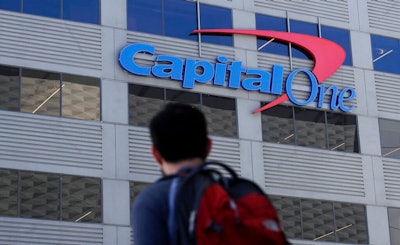
SEATTLE (AP) — A hacker accessed the personal information of 106 million Capital One credit card holders or credit card applicants in the U.S. and Canada, in the latest massive data breach at a large company.
Capital One Financial Corp., one of the nation's largest issuers of credit cards, said among the information obtained by the hacker was 140,000 Social Security numbers and 80,000 bank account numbers. It said no credit card account numbers or log-in credentials were compromised.
The breach is among the largest of a major U.S. financial institution on record. The bank said the bulk of the hacked data consisted of information supplied by consumers and small businesses who applied for credit cards between 2005 and early 2019. Consumers concerned that their information may have been hacked are advised to take steps such as obtaining a free copy of their credit report or freezing their credit.
Capital One's stock tumbled nearly 6% Tuesday, the largest single-day decline since January.
Paige A. Thompson, who uses the online handle "erratic," was charged with a single count of computer fraud and abuse in U.S. District Court in Seattle. Thompson made an initial appearance in court and was ordered to remain in custody pending a detention hearing Thursday.
Federal agents began tracking Thompson online after being notified by Capital One of a possible breach in July.
On June 18, Thompson sent a message on Twitter to another user saying, "Ive basically strapped myself with a bomb vest, (expletive) dropping capitol ones dox and admitting it."
The FBI raided Thompson's residence Monday and seized digital devices. An initial search turned up files that referenced Capital One and "other entities that may have been targets of attempted or actual network intrusions."
Thompson was a former employee of Amazon Web Services, which is Amazon's cloud computing division. Thompson was a systems engineer at AWS between 2015 and 2016, about three years before the breach took place. Capital One has been enthusiastic about using cloud technology to store its data in recent years and has been a big customer of AWS' cloud platform for some time.
A resume Paige Thompson posted on a Slack group she created says she worked on its front-end interface with users and security updates.
There is no evidence that Amazon's cloud system was involved in the breach.
"AWS was not compromised in any way and functioned as designed," a company spokesperson said Tuesday, adding that the system vulnerability that Thompson exploited "is not specific to the cloud."
Capital One was notified by a third party on July 19 that its data had appeared on the code-hosting site GitHub, which is owned by Microsoft. The McLean, Virginia, company says it immediately notified the FBI.
The FBI said a Twitter user who went by "erratic" sent a user direct messages warning about distributing the bank's data, including names, birthdates and Social Security numbers. That user reported the message to Capital One.
Capital One said it believes it is unlikely that the information was used for fraud, but the investigation is ongoing.
The data breach involves about 100 million people in the U.S. and 6 million in Canada.
In addition to data such as phone numbers, email addresses, dates of birth and self-reported income, the hacker was also able to access credit scores, credit limits and balances, as well as fragments of transaction information from a total of 23 days in 2016, 2017 and 2018.
Capital One, the nation's seventh-largest commercial bank with $373.6 billion in assets as of June 30, is the latest U.S. company to suffer a major data breach in recent years.
In 2017, a data breach at Equifax, one of the major credit reporting companies, exposed the Social Security numbers and other sensitive information of roughly half of the U.S. population.
Last week, Equifax agreed to pay at least $700 million to settle lawsuits over the breach in a settlement with federal authorities and states. The agreement includes up to $425 million in monetary relief to consumers.
Many major banks have sought to stem the risk of data breaches in recent years. JPMorgan Chase, Bank of America and Citibank began replacing customers' debit cards several years ago with more secure chip-based cards. While the cards with chips are common these days, many merchants still rely on the older, less secure card-swiping equipment. Credit card companies have also beefed up fraud monitoring in the wake of high-profile data breaches that hit retailers such as Target and Home Depot.
The average cost of a data breach in the U.S. last year was just under $8 million, according to a study by IBM Security and Ponemon Institute.






















